An unpretentious variety of eggplant "Robin Hood" - ideal for beginning farmers
Robin Hood is one of the most unpretentious eggplants with a short adaptation period and excellent taste. The variety has been cultivated for about 20 years and has stable popularity among both experienced summer residents and novice gardeners.
You will learn about its features, methods of cultivation, advantages and disadvantages from this article.
Description of the eggplant variety
To get a harvest, find out more about the selected variety, take into account the characteristics of its cultivation and the recommendations of experienced farmers.
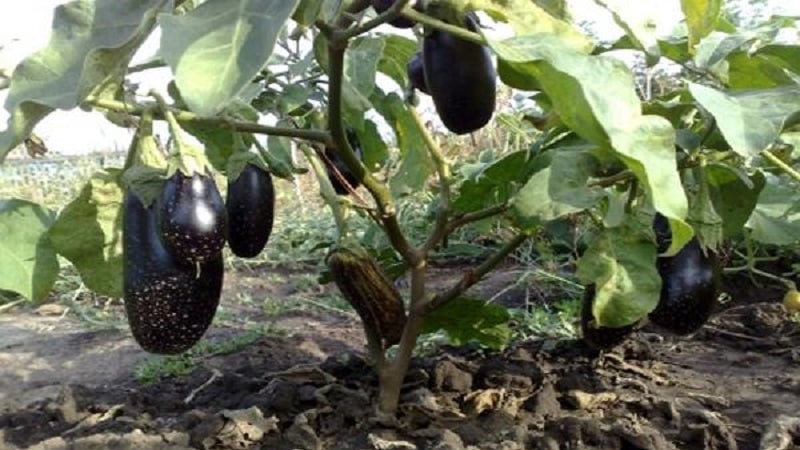
Distinctive features
Robin Hood is an early, high-yielding variety. Not demanding in care. Compact, short. Does not require pinching. Used for preparing caviar, main courses and various salads. Suitable for long-term storage. They are not able to hold heavy branches, so the bushes are tied up to create support.
Characteristics
The popularity of the variety is due to its unpretentiousness and productivity and fruit characteristics.
Bush:
- height from 40 to 90 cm;
- few side shoots;
- a large number of buds (up to seven fruits per bush);
- ripening period – 90 days.
Fetus:
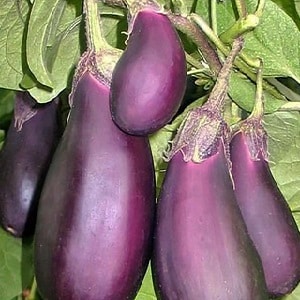 pear-shaped;
pear-shaped;- purple;
- weight up to 300 g;
- length up to 20 cm;
- diameter – 9 cm.
Taste qualities:
- tender pulp without bitterness;
- few seeds;
- thin shiny skin;
- used in cooking, for canning and fresh.
Seven fruits grow on the stem, their total weight reaches 2.5 kg. One eggplant fruit weighs up to 300 g.For eggplant, these are high yields.
Other varieties of eggplant:
Eggplant "Black Beauty" and how to grow it
How to grow this variety yourself
Eggplant variety Robin Hood suitable for beginner gardeners, as it will bear fruit even in an environment unfavorable for growth. Seeds for seedlings are sown in mid-March.
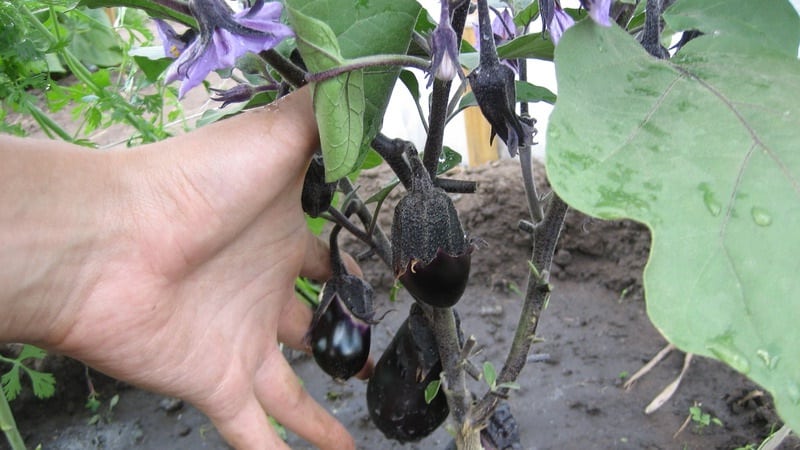
Growing seedlings
For the cultivation of seedlings, two-year-old seeds are used.. Before sowing, they check for germination, disinfect, and strengthen. For these purposes, a manganese solution and growth stimulants “Epin” and “Kornevin” are used.
It is worth sowing no deeper than 2 cm in warm, moist soil. The first shoots appear within seven days after sowing. At this time, the beds are prepared.
Transfer
The bushes are transplanted into elongated beds at least 60 cm wide. It is recommended to leave a space of 40-50 cm between seedlings. The plant is small, but for good development and fruiting it needs constant free access to air.
The bush is formed so that plants growing nearby do not interfere with each other. Before planting, the soil is fertilized with fortified fertilizers containing nitrogen and phosphorus.
Important! At first, the development of seedlings may stop, since the formation of the root system occurs first.
Further care
Birch ash, legume roots or a special solution are used to fertilize the soil.. To prepare it, add straw, branches and roots of nettles and legumes. Then compost soil mixed with ash is poured. Fill with water and cover with a lid or film.
The lid is removed from time to time and the solution is stirred. The resulting mixture is used to treat the soil around the plants. Feeding begins three days after planting the seedlings. It is not possible to water the bush itself with fertilizer - you can burn the stems and roots.
Features of cultivation and possible difficulties
As you grow carry out systematic cleaning of the lower yellowed leaves, spraying for disease prevention and pest protection.
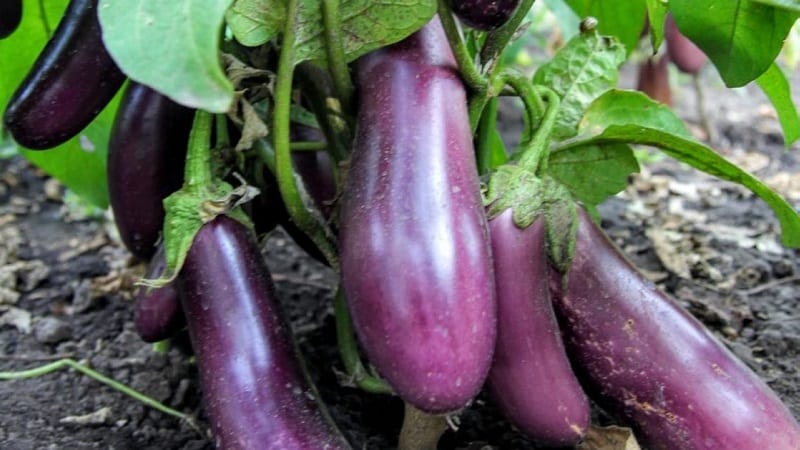
Water vegetables every time the top layer of soil dries out. Before watering, the beds are cleared of weeds. By adding soil to the bed itself, the row spacing is made deeper. Carry out this work carefully so as not to damage the roots or the plants themselves. Fertilizers are placed between the bushes and then watered. The beds must be completely watered.
Reference! Before flowering, abundant watering is required once or twice a week. Then three times a week. In rainy weather, water once or twice every ten days.
To increase productivity, it is recommended to form bushes. When they reach 25 cm, pinching is done, which has a beneficial effect on the development of lateral shoots. From the shoots, 6-7 of the strongest are selected, the rest are removed. To save energy, plants promptly remove yellow leaves, deformed fruits and shoots without fruits.
Diseases and pests characteristic of the variety
Eggplants are most often affected by the Colorado potato beetle., to combat which chemicals and traditional recipes are used. Ideally, it is recommended to use chemical-free control methods. Their disadvantage is that they have a short-term effect and require frequent repetition of treatment. But substances harmful to the human body do not accumulate in the fruits.
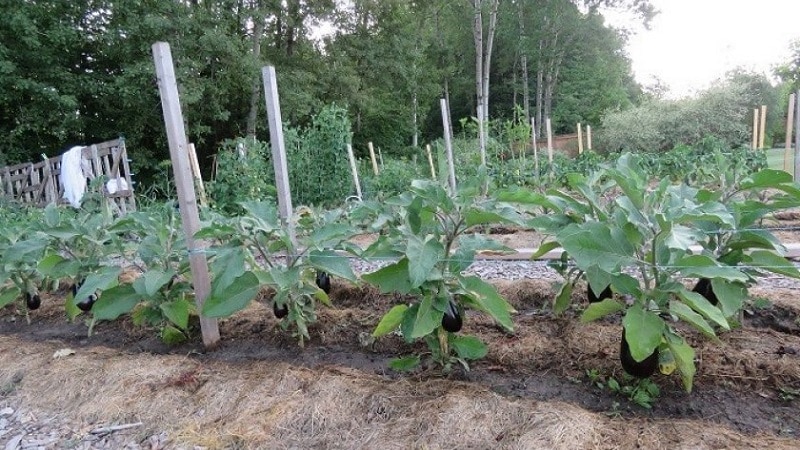
Chemicals are more effective, but harmful compounds accumulate in the plant, which then end up in the fruit.
To cultivate small areas of land, use the following composition:
- slaked lime;
- wood ash;
- tobacco dust.
The ingredients are mixed in a ratio of 1:2:1 and scattered in the beds between the rows of seedlings.
Eggplants are prone to the following diseases:
- blackleg.
- late blight;
- gray rot;
- mosaic;
- stolbur.
For treatment and prevention, timely treatment is carried out disinfectants and strengthening agents, for example Fitosporin.
Read also:
The subtleties of caring for the Black Opal eggplant and its benefits
Eggplant “Nutcracker”: advantages and disadvantages of the variety
Harvesting and application
Determining the degree of maturity based on the appearance of eggplants is not easy. Most often, ripeness is determined based on the length of the fruit..
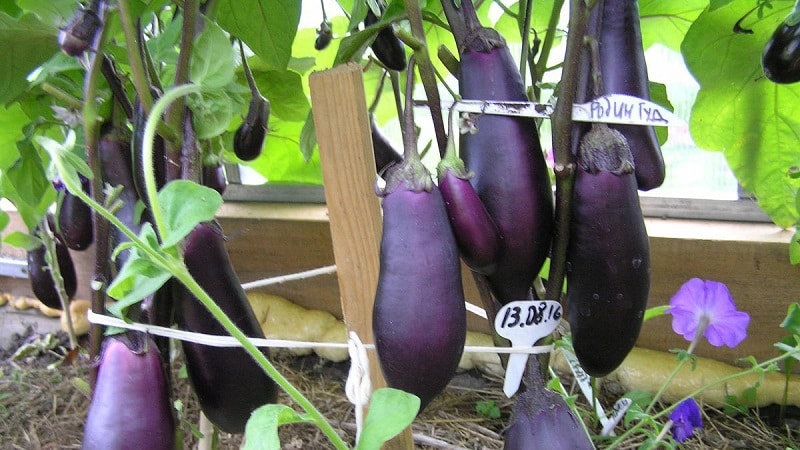
Another way to find out whether a vegetable is ripe or not is by pressing on it.. If the remaining dent does not level out over a long period of time, it means it is not yet ripe. If it levels out quickly, carefully cut the eggplant. To do this, use garden shears.
To keep vegetables fresh, they are covered with straw and put into a dark, cool room. This allows you to preserve the vegetable for up to two months.
Attention! If you want to store eggplants longer, then they need to be cut into rings, put on threads and dried in a dry, cool, ventilated room.
Robin Hood is pickled and salted in dozens of ways. The vegetable retains its taste and nutritional composition.
Advantages and disadvantages of the variety
The advantages of this variety of eggplant include: the following indicators:
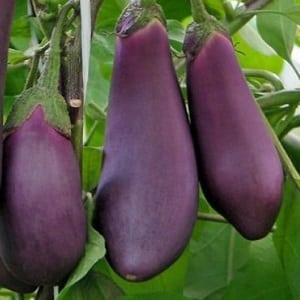 unpretentiousness;
unpretentiousness;- high taste qualities;
- early ripeness;
- compactness of bushes;
- high yield.
There are very few disadvantages:
- the need to tie bushes to supports;
- need for shelter from frost;
- prolonged ripening of fruits in low light.
Reviews from those who grew
To make a choice of variety, beginners usually study reviews from experienced farmers. Below are some of them.
Lyubov, 45 years old, Moscow, Stupinsky district: “I decided to plant eggplants for the first time in 2018. I sowed the first packet - there were no shoots. Then I sowed another variety and it sprouted very well. I was satisfied with the harvest. I used only my own eggplants for cooking and canning. The variety that has not sprouted is hippopotamus. The ascendant is Robin Hood. Eggplant, like peppers, does not like transplanting. It is worth replanting only with a lump of earth so as not to touch the roots. I planted one seed per cell, after the first true leaf appeared, I transplanted it into larger containers along with the soil. Grown in a greenhouse. I didn't pay much time or attention to them. Agricultural technology like pepper. Only with eggplant I removed the shoots and lower leaves, but I don’t do this with peppers.”.
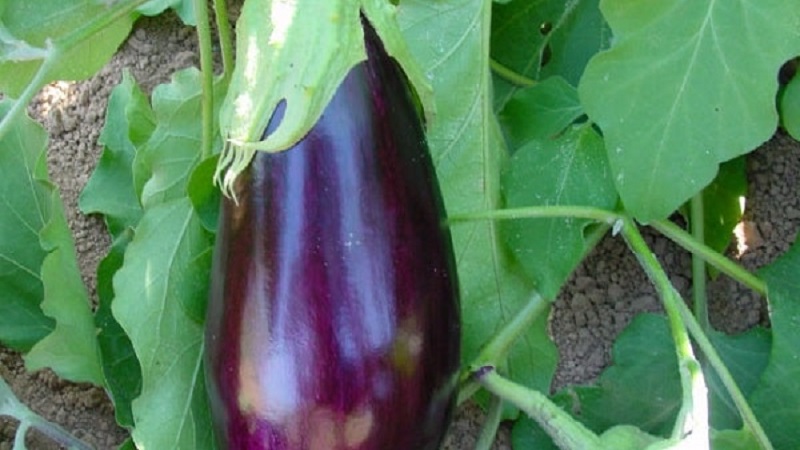
Anton, 50 years old, Bryansk region: “When I got my own plot of land, I also had a desire to have my own vegetable garden, and always with a greenhouse. I started by growing greens under film. During this time, I “ennobled” my poor clay soil. I built a greenhouse in one of the sunniest places and decided to try planting eggplants. The choice fell on the Robin Hood variety because it seemed to me the most unpretentious.
A photo of a ripe vegetable on a package helped me finally make my choice. Shoots appeared quickly. I bought fertilizer in tablet form at the store, diluted it with water and watered it every three days.After a month and a half, there were beautiful seedlings in the pots, each with 5-6 leaves. I planted it in my greenhouse and covered the row spacing with ammonium nitrate. The bushes sprouted quickly, and within a month I was already tasting the first fruits. I often cook vegetable stew with eggplants. The taste of Robin Hood is beyond praise - the flesh is not bitter at all, there are almost no seeds. Next year I’ll plant eggplants in the garden - the soil should be ready by then.”.
Conclusion
Eggplants of the Robin Hood variety are unpretentious in cultivation and are not demanding on the composition of the soil. Adaptable to any climatic conditions of the region. Even a beginner in gardening can plant them and get a harvest. An excellent variety with excellent taste and thin skin.